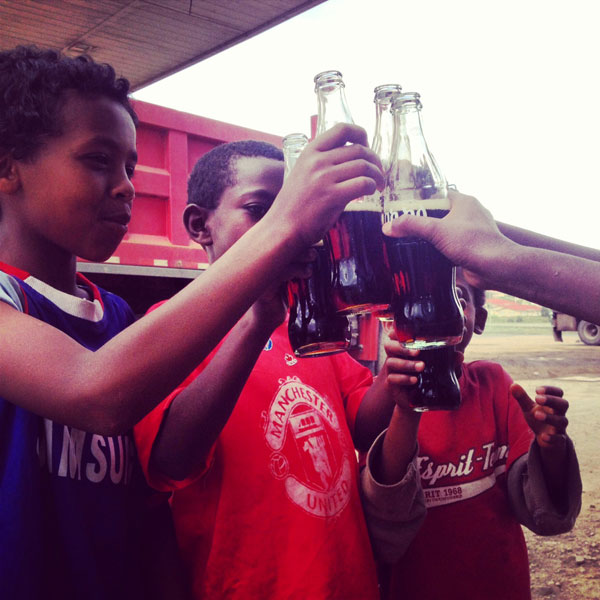There’s something about being in Africa that makes me become more generous all of a sudden – everyone I come across becomes a victim through my eyes, as I’m sure I’m a walking dollar sign in theirs. Everywhere we go, people flock to us – from the kids playing soccer on the side of the road, to women walking by with their babies when we’re stuck in traffic, to the panhandlers on the sidewalks many of which have physical disabilities. If a couple of ‘Ferengie’ have the time and money to take a stroll through Addis on a summer day, they must have some change to spare. I mean for good reason too – with a conversion of ~20 brr for every $1, a couple of cents can go a long way here.
But with so many hands outstretched towards you, how do you decide which to lend a hand? It pains me to look the other way when someone approaches me for money, and the times I do give, I’m always left thinking – maybe those couple of brrs could have been better spent in someone else’s hands.
I’ve come to classify my handouts to three distinct groups. There are the passive panhandlers, who use their physical disabilities or their young children to gain the sympathy of tourists. There are the aggressive pan handlers, the majority of which are teenagers and young adults who often follow us, and persistently ask us, often tapping us on the arm or the back until we give in. Then there are small entrepreneurs, who put down blankets on the side of the road trying to sell the bananas growing in their back-yards, or the lottery tickets handed out by the government, or the hats that they’ve woven from oxen and goat hide.
As a business student, and a person who believes in value for hard work, it’s this third group that I’ve developed a great soft-spot for. As a socialist, I believe strongly in philanthropy and charity, but I’ve come to realize the best way to move out of poverty is through economic health. Providing a service/product creates a flow of money and commodities, it creates supply and demand that churn the gears of society, and it creates jobs that lift people out of depression (from a personal and economical stand-point). And the best thing about it is there’s no age or level of experience required to do this.
On Easter day, I ran into a young boy (maybe around 10-12 years old) who was carrying around a chicken tucked in his right arm, and a small book in his left hand. He was writing numbers in the book and selling them as lottery tickets for a chance to win the chicken. Then walking through a village a few days ago, I ran into another young man who had used horse hair and goat fur to weave hats that he was selling. These small entrepreneurs can be found all over the place in Ethiopia – from bakeries operated out of vans, to the multitude of shoe shiners, to the hand-woven rug makers. And it is important to support these business owners – because they’re taking the initiative to help themselves, and provide a service to their community at the same time.

That being said, it still feels good to give to the less fortunate at times, but giving does not always have to be in the form of money. This past weekend, the three of us including Alex ventured out to explore the area outside the compound. From the gates, a wide dirt clearing separated the compound from a large hill, where we often saw people playing soccer. We figured if we threw around a Frisbee on this patch of dirt, we were bound to run into some locals. As truth be told, 5 minutes in, we had onlookers and children running towards us from all directions. One of them brought a small ball with them. Where we showed them the techniques of Frisbee throwing, they taught us the art of kick-ups.
While they spoke little English, we gestured to them we were going to climb the large hill, around which many of them lived. They lit up and happily ran in front, confident to guide us through their backyard they knew all too well. As we hiked, Darren brought out a few sheets of Canada stickers that he handed out to the 8 children who came with us. They stuck them all over their faces and t-shirts, proudly pointing and proclaiming they were from Canada. At the top, we had a little photo-shoot – showing the children how to use our cameras and letting them take pictures of each other.
This was one of the many faces of giving. By spending time with these children, we exposed them to something new and provided an experience that was more rewarding than giving them a few brrs and sending them on their way. We helped them create memories that I’m sure many of them will brag to their friends about for much time to come.
On the way down, we took them to a nearby gas station and brought them all pop drinks. As we sat on the steps outside the station kiosk, two locals who entered the store brought out loafs of bread that they wanted us to give to the children. It was amazing to see that we had inspired others to also give. As the children headed home, they waved good-bye, saying their thank-you’s as one of them yelled back, ‘I love you’.
And at that moment, I didn’t see these children as victims needing my help, as I’m confident I was not a walking wallet in theirs. At that moment, we were friends.
